I cannot bring myself to accuse anyone else of sins for which I am or have been guilty. So, for the purposes of this article I will write about myself and accuse only myself. I hope that if you have need to repent for anything I talk about that you will liken this gentle rebuke unto yourself and make the needed changes. I am working on cleaning up my act so I will no longer fall into the category of the greedy poor, even though I am no longer poor.
This sounds like such a harsh designation – the greedy poor. Some use the phrase – the proud poor. Either way, I need to find a way to check my pride and avarice (an insatiable greed for riches) at the door. The problem is, I can’t seem to figure out where it comes from. What caused me, as a poor person to be proud or arrogant in my status of being poor, but at the same time be guilty of coveting the riches others possess?
I’ve been through publicly humiliating financial troubles. I’ve had the neighbors watch as my furniture was repossessed. I’ve been through the humiliation of bankruptcy court hearings and the endless calls of the bill collectors whose job it is to make you feel like the worm you are because you are not borrowing money from every distant relative you have to pay them back (with interest).
I’ve lived through the shame of not having my children go on field trips at school because they knew we couldn’t afford the fees so they didn’t bother to tell me they needed the money. I found out after the fact that they had to stay behind, all alone in their classroom while the rest of the class went and explored.
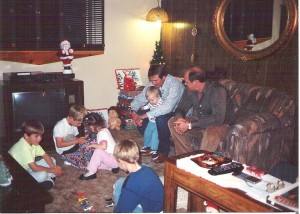 I’ve had year after year when the only Christmas my children received was the one that showed up on Christmas eve on our doorstep because someone was generous and kind and did for me and my children what I obviously could not do.
I’ve had year after year when the only Christmas my children received was the one that showed up on Christmas eve on our doorstep because someone was generous and kind and did for me and my children what I obviously could not do.
My children have slept on the floor or on mattresses on the floor because we couldn’t afford a bed frame or any other bedroom furniture. We’ve shopped the yard sales and thrift stores for clothing and cookware. I’ve done my time at the Bishop’s Storehouse because I couldn’t feed my children without the help of the Church.
Yes, I know what it is like to be poor. I haven’t had it as bad as many, but I do know the feeling of frustration as you watch your child suffer with illness you can’t afford medicine to treat. I’ve stayed up all night feeding a fire in the fireplace to keep at least one room in our house warm enough so that our newborn baby didn’t catch pneumonia. I’ve walked miles and ridden the bus lines because I couldn’t afford to fix my clunker of a car. Been there. Done that.
I think somewhere in all that I began to realize that being poor was the most expensive way to live. Sales are for the “rich,” those who can afford to spend when the sale happens to begin. Buying in bulk is for the “rich” who have chest freezers and can afford to buy large quantities when the price is low. If you are poor you have to buy what has to be bought when you can buy it. If you don’t you lose your chance to get it at all.
I think this must have been where I developed my holier-than-thou attitude toward those with money. I knew true physical and social hardship that those who have always had sufficient or plenty have never experienced. I developed a real sense of distrust of those who had money, because they were always clueless to the needs of the poor, the shame we lived with, and the social stigma attached to living like we did.
I also became proud. I resented having to depend on the generosity and kindness of others just for basic things. I was constantly asking for favors. I needed more time to pay off bills, I needed forgiveness of debt I couldn’t pay. I needed help with medical bills. If someone in a professional position abused one of my children I had no recourse. I had to swallow my bitterness and anger at how someone treated my child and move on. I wasn’t in a position to exact justice. I became resentful of people’s kindness, that very kindness upon which I so desperately clung to for survival.
If I ever became financially comfortable I would not be like those people who are so clueless about those around us who have so many needs that they cannot fill. And there are many who seem to have a bottomless pit of need. I was one of those. I hated it. I loathed myself and society for it, but I couldn’t change it. All doors for change seemed shut tight. When I did find an opportunity for improvement I soon found that the demands of my family required a change that shut yet another door.
Bankruptcy
When I went through bankruptcy I learn some important lessons about myself. First, I learned that if you are poor enough, people stop hounding you and shaming you to get the money you don’t have. The peace from the phone calls from the creditors was unbelievably blissful. A whole stack of shame seemed to melt away. If I had had the money, they would have been paid.
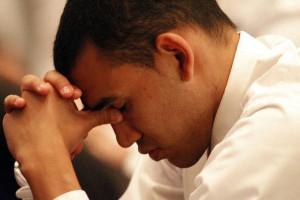 I also found that when I was at my very poorest that I felt freer than I have ever felt to share what little I had with others who were equally poor or even worse off. It was a joy to give to the “poor.” But I discovered that the more money I got the less I gave. The less I helped others. The less I felt inclined to donate.
I also found that when I was at my very poorest that I felt freer than I have ever felt to share what little I had with others who were equally poor or even worse off. It was a joy to give to the “poor.” But I discovered that the more money I got the less I gave. The less I helped others. The less I felt inclined to donate.
I finally had options. When you have no money, and hence no options for spending it, you are free of the burden of choice. Once you have $100 you have $100 worth of choices to make. Which bill to I apply it towards? Do I spend it on myself? Do I spend it on the children, who have suffered so much? Do I stock up on groceries? Oh the agonizing decisions!
If I had $1000.00 the problem was multiplied ten fold. I got so busy deciding how to spend what little money I had that I began to forget those who had none. I recognized this was happening, but I was so involved in my drive to not be that poor again, and to buy while I could, that I ignored the promptings to give and to help. My life became caught up in the race to accumulate what I had never been able to have before. I didn’t want to look poor or dress poor. I didn’t want to eat poor or shop where the poor shop.
It was like I was running from a life that was all too familiar to me towards a life I really knew nothing about. I hadn’t learned how to spend frugally and gain control over my income. The poor can’t afford to be frugal, they buy when they have to buy and pay what they have to pay. There were many things about the non-poor life that were traps to me, because I didn’t know any better.
What the Lord says
In Doctrine and Covenants 56:17 the Lord chastises the arrogant poor, those who have not learned to be humble and grateful in their extremity. I can’t tell you how difficult this is to do. I knew people who were genuinely humble in the depths of their poverty. They are my heroes.
17. Wo unto you poor men, whose hearts are not broken, whose spirits are not contrite, and whose bellies are not satisfied, and whose hands are not stayed from laying hold upon other men’s goods, whose eyes are full of greediness, and who will not labor with your own hands!
I never stole from others, but that didn’t stop me from resenting what others had because I didn’t have it. Fortunately, I wasn’t a lazy worker either. But I was definitely not contrite, nor was my heart broken. I was too filled with anger and resentment to be humble and contrite. And my eyes were definitely full of greediness.
The wisdom of King Benjamin
The full part of the sermon in the Book of Mormon King Benjamin gives I hope you will read and study is Mosiah 4:16 – 27. The part that I want to focus on is verses 24 and 25.
24. And again, I say unto the poor, ye who have not and yet have sufficient, that ye remain from day to day; I mean all you who deny the beggar, because ye have not; I would that ye say in your hearts that: I give not because I have not, but if I had I would give.
25. And now, if ye say this in your hearts ye remain guiltless, otherwise ye are condemned; and your condemnation is just for ye covet that which ye have not received.
Recap: You poor who have enough to survive from day to day, if you don’t give to the poor who ask for your help, and the reason is because in your heart you would give IF YOU HAD then you are excused by the Lord for not giving. However, if you had enough to share with another and yet you would make some excuse for not sharing with the poor who petitions you for your help then you stand condemned before the Lord. Why? Because you have coveted “that which ye have not received.”
What does that even mean anyway? I have puzzled over that statement for years. It wasn’t until literally today that I began to have an inkling of what King Benjamin was saying. To covet that which we have not received is an attitude of selfishness. Even if I had enough to share with the poor I wouldn’t do it. I think it falls in line with the statement of the Savior when he said that a man who even looks on a woman to lust after her has already committed adultery with her in his heart (Matthew 5:28).
King Benjamin is telling us that the poor who have sufficient to live from day to day, who covet the wealth possessed by others, like I did, stand condemned, because even if they had the ability to help others they wouldn’t do it. True, they don’t physically have the ability to help, but they have committed the sin in their hearts already because they wouldn’t have helped even if they could have.
Fortunately, I have learned a lot about my attitudes toward the rich and toward the poor. I have gained a better appreciation for those who have sufficient and who are kind and generous in helping others. I also am working on learning to be more generous with what funds I have available to me to work with.
I don’t give as much as I should. I don’t serve others as much as I could if I put my mind to it, but I am getting better at it.
Final Thoughts
It is that time of year when being grateful and being kind are supposed to go hand in hand throughout each community and home. This is the time of year we usually make an extra effort to be better people towards those who have less than we do.
I don’t want to turn this into a Dickens novel, but we really do need to pull the needs of the poor and needy more to the forefront of our thinking. We need to try to learn to be more aware of their needs each and every day, not just at this time of year.
The poor shall always be with us. This is actually a good thing. The poor have the (somewhat enforced) opportunity to learn humility, which we all need to learn more about. The wealthy need to learn better the lessons of charity, tolerance, and love for those society sometimes teaches us are lazy and not worthy of our time or patronage.
The Savior would differ with this teaching. He gave to all whatever it was that was needed to relieve their suffering and to help them in the best way possible. I hope during this Christmas season that we will all look a little more closely at how we can draw closer to our Savior by being a little less enamored by the glitter of the shopping malls, and be a little more drawn to the golden opportunities to bless the lives of those who need our help more than we need our parties and gifts.
About Kelly P. Merrill
Kelly Merrill is semi retired and writes for https://gospelstudy.us. He lives with his wife in Idaho. His strength is being able to take difficult to understand subjects and break them down into understandable parts. He delights in writing about the gospel of Christ. Writing about the gospel is his personal missionary work to the members of the Church and to those of other faiths who are wanting to know more about Christ's gospel and His Church.

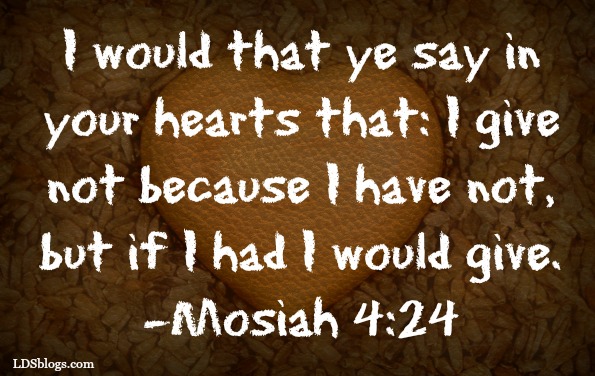
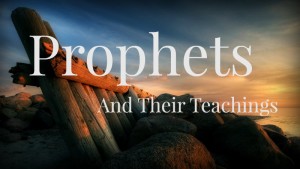


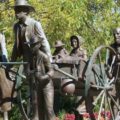
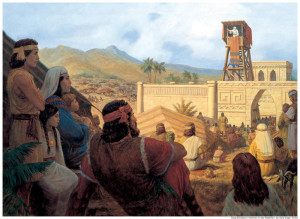

I’ve been pondering this for a very long time. I was also puzzled by King Benjamin’s message. This helps me understand more. Thank you.
P.S. I admire your testimony.
Thank you for these thoughts. Your examples and insights are truly great. Love you!
I admire your honesty and humility in reaching out to us readers, and to try and help us understand how we can better apply this principle taught in our Book of Mormon.
Being in service of others helps me with repentance of my sins and short comings. I have worked for millionaires , who worry about money. I can truly say ,”their not rich” for when every knee shall bend, then shall all shall know the cost of money of one’s soul.